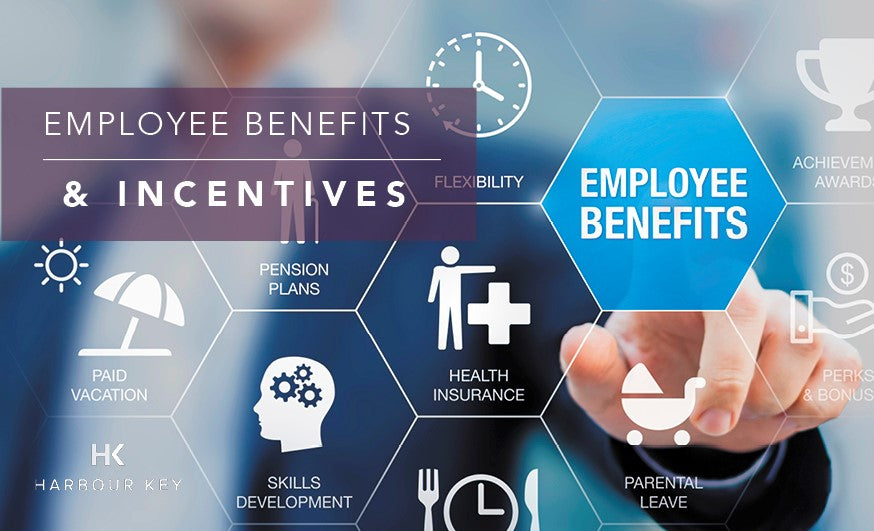
TAX EFFICIENT EMPLOYEE BENEFITS AND REWARDS
Speaking to our clients, they all are “feeling the pinch” which is being reported in the news. Energy and material supplier costs are on the increase, in addition to which all businesses whichever sector they operate in, are finding it very difficult, if not impossible, to recruit new employees, impacting delivery of existing business, and also growth. Last month we looked at raising cash via BUSINESS GRANTS. This month we look at the workforce challenge, recruiting and retaining employees!
At the end of May, the BBC reported that there are more job vacancies than unemployed people in the UK for the first time since records began. Although statistics can be challenged, it is clear from working with our clients that staffing is a big issue. The big corporations with big budgets can throw lots of money at recruitment and outspend the type of businesses Harbour Key support, but this is not always the case.
Finding candidates is a challenge in itself but attracting and retaining them is just as challenging. With the cost-of-living crisis most employees want increased salaries, but there are ways that employees can be rewarded that can be more tax efficient than simply paying extra salary, which still improves their personal financial position.
The general rule is that an employee has to pay tax and National Insurance (NIC) on expenses paid and benefits provided by an employer. We have set out a number of tax-free benefits below which could be considered as part of an employee’s remuneration package, and how they improve the employee’s personal financial position.
Electric cars
Normally, the taxable benefit on a company car is based on the level of CO2 emissions, the higher the emissions the higher the tax cost. From 6 April 2022 until 5 April 2025, full battery electric vehicles will pay only a 2% benefit in kind tax charge, with no rise expected during this period. This compares to 37% at the opposite end of the emissions scale. The 2% rate also applies to company cars registered after 6 April 2020, with emissions from 1-50g/km and which have an electric mile range of 130 miles or more.
An employee may have their own private car which is either under a hire purchase or loan agreement or private lease hire agreement, which is being paid out of salary which has been subject to income tax and NIC. If the employee is provided with an electric company car as part of their employment package, the benefit in kind charge is likely to be less than the tax on the equivalent wage required to service the loan. If the company buys the electric car, the cost can be claimed against corporation tax in the first year. If the company leases the car, 50% of the VAT can also be reclaimed by a VAT registered businesses and the rentals deducted against corporation tax.
There would be further savings for the employee on the cost per mile of electricity versus fuel, particularly with fuel now reaching £2.00 a litre.
Mobile phones
An employee may have a personal mobile phone in which case the contract, or if on pay as you go, will be paid out of salary which has been subject to income tax and NIC. A company mobile phone provided to an employee is not charged as benefit in kind even with private use.
The company can reclaim VAT if registered and deduct the cost of the phone and/or monthly contract for corporation tax
Cycle
A cycle or cyclist safety equipement can be provided to employees without any tax implications, under what is referred to as the cycle to work scheme, provided the qualifying conditions are met and there is no transfer of property in the cycle or cycling equipment.
The key point to achieve the tax benefit, is that the cycle has to be used for all or part of the employees’ journey to work.
Individual Life insurance
Relevant life cover means life insurance premiums for one individual rather than a company-wide policy. A death in service policy, can be paid by the company on behalf of an employee, and this can be structured so no benefit arises on the employee, but the cost can be deducted for tax purposes by the employer.
In the Company is providing and paying for the policy, the employee can make a decision to cancel any private policies they may hold, thereby making a saving.
Work Related Training
Generally speaking, work-related training, together with any incidental benefit alongside the training, is tax-free. The Company can also claim a tax deduction for the cost.
A potential employee may be paying for their professional training personally, or may wish to undertake training, which as a new employer you can offer.
Relocation Expenses
If a potential candidate has to relocate to take up the role, the employer can provide a tax and NIC free relocation allowance worth up to £8,000, subject to all the qualification requirements being met.
Pension contributions
No taxable benefit arises if an employer pays into either the employee’s occupational pension scheme or into the employee’s personal pension scheme.
One of the most valuable benefits that employees receive from their employers is an employer’s contribution to the employee’s pension scheme. This is exempt from tax as long as the pension scheme has HMRC approval and pension contributions do not exceed the annual or lifetime allowances.
Sporting and recreational facilities
An employer can provide sporting and recreational facilities to employees, which is a tax-free benefit provided not available to the public (so gym membership would be a taxable benefit). We have advised a client who has fitted out a small gym with a shower facility in their offices.
The costs of fit out and equipment costs, will generally be a deductible expense for the Company. The provision of a small gym may generate a saving for an employee in terminating their gym membership, while encouraging them to maintain a level of fitness.
Health benefits
There are a variety of health benefits that are exempt from tax and NIC. These include annual medical checks or health screening, eye tests for employees using computer screens and any necessary glasses or contact lenses, treatment or insurance for injuries or diseases that result from work, including treatment when working overseas and up to £500 to help a person to return to work.
Company Share/Option Schemes
The HMRC approved share and share option schemes are not tax-free benefits, but are very tax efficient, as they result in advantageous tax treatment for qualifying employees. For example, the enterprise management incentive (“EMI”) scheme, enables small to medium sized employers to grant an employee a share option (a right to a future share), which provided the option is granted at market value means there are no income tax charges, and the employee only pays capital gains tax when they have exercised their option and sold the share, which could be at a 10% tax rate.
The following are tax exempt benefits, which will not provide any additional funds for the employee, but will improve morale:
Annual celebrations and parties
These are exempt where they cost £150 (including VAT) or less per employee, they are annual events and open to all employees. Where there is more than one location or department and several events are held, these can still be exempt as long as all employees can attend one of them. Where more than one event is held in the year the costs are to be aggregated and the £150 per employee limit applies to the aggregate amount.
Trivial Benefits
Tax is not payable on trivial benefits. These are benefits that are not:
- A cost of more than £50 to provide;
- Cash or a cash voucher;
- A reward for work or performance; and
- In the employee’s contract.
Trivial benefits provided regularly (such as end of month drinks) could be regarded as being a reward for work, so will not be a trivial benefit. Contractual benefits may include situations where individuals are required to work early or late once a month (say, to prepare for the monthly accounts meeting) and the employer agrees to provide a meal or snack and consequently it is not qualifying as a trivial benefit. But, where the workplace provides free or subsidised meals to all staff then this would be a tax-free benefit.
Trivial benefits are gifts to employees and not a part of a promise. For example, gift cards, costing £50 or less, can be given to employees; and Christmas or birthday gifts are frequently treated as trivial benefits. Several trivial benefits a year can be given and their value is not combined for the £50 limit. Where the benefits are provided to a director of a close company (or a member of their family or household) there is an annual cap of £300.



